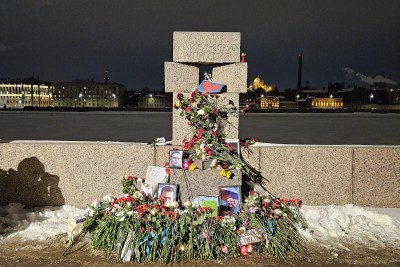Escalation after Navalny's Death: Diplomatic Aftermath Between Austria and Russia
The death of Russian opposition leader Alexei Navalny has not only caused international outrage but has also led to a diplomatic dispute between Austria and Russia. An investigation into Navalny's death amidst unjust imprisonment has been also requested by the OSCE in Vienna.
 At the monument in St. Petersburg to the victims of political repression, a spontaneous memorial was erected for Alexei Navalny. / Picture: © Wikimedia Commons / Gesanonstein [Creative Commons CC0 1.0 Universal Public Domain Dedication]
At the monument in St. Petersburg to the victims of political repression, a spontaneous memorial was erected for Alexei Navalny. / Picture: © Wikimedia Commons / Gesanonstein [Creative Commons CC0 1.0 Universal Public Domain Dedication]
Austrian Federal President Alexander Van der Bellen unequivocally blamed "Vladimir Putin and his murderous regime" for Navalny's death on the social media platform X, which prompted a firm reaction from the Russian embassy in Vienna.
I am shocked by the news of Aleksej Navalny's death. Vladimir Putin and his murderous regime bear responsibility for this. My thoughts are with the relatives of Aleksej Navalny and all those who continue to fight courageously for freedom, democracy & human rights in Russia. (vdb)
— A. Van der Bellen (@vanderbellen) February 16, 2024
In a protest note to the Austrian Foreign Ministry, the Russian embassy expressed its outrage at Van der Bellen's remarks and condemned them as "insulting rhetoric". Austria's Foreign Minister Alexander Schallenberg (ÖVP) rejected Moscow's criticism and emphasized the need for a full investigation into the circumstances of the death, without directly blaming Moscow.
Im Zusammenhang mit den beleidigenden Erklärungen von @vanderbellen gegen Russland und die russische Führung hat die Botschaft beim österreichischen Außenministerium entschlossendsten Protest eingelegt.
— RusBotschaft Wien (@RusBotWien) February 16, 2024
Diese Art von unverschämter Rhetorik ist inakzeptabel. pic.twitter.com/CS3J8PQIIg
The Western world is deeply saddened by the death of Navalny, who died in a Russian penal colony. The EU, represented by Commission President Ursula von der Leyen and Council President Charles Michel, as well as the USA and NATO, held the Russian regime responsible for the death and called for an investigation.
In Austria, Van der Bellen's clear position met with approval from members of the government and the opposition. Foreign Minister Schallenberg and Federal Chancellor Karl Nehammer (ÖVP) called for an independent investigation, while Vice-Chancellor Werner Kogler (Greens) emphasized the need for an international clarification of the circumstances of the death. SPÖ leader Andreas Babler and Neos leader Beate Meinl-Reisinger also expressed their dismay and called for justice.
Navalny's death shortly before the Munich Security Conference and the Russian presidential elections shed light on the political tensions between Russia and the West. While the Austrian government avoids a public debate about a possible recall of the Russian ambassador, the international community remains united in grief and anger over the loss of a courageous voice for freedom and democracy in Russia.
OSCE calls for Investigation
The OSCE Office for Democratic Institutions and Human Rights (ODIHR) has expressed deep sorrow over the death of Russian opposition politician Alexei Navalny, who died while serving a lengthy sentence in prison, a situation the organization deems a result of years of unjust imprisonment and a blatant denial of fair trial rights.
ODIHR Director Matteo Mecacci articulated the institution's distress, stating, “The demise of Alexei Navalny is profoundly unsettling. His incarceration from the outset represented a stark infringement of fundamental freedoms, including the right to dissent and the entitlement to a fair judicial process.”
The OSCE body has urged Russian authorities to initiate an immediate and transparent investigation into the precise circumstances surrounding Navalny's death, advocating for unrestricted access for Navalny’s legal representatives to all pertinent information and proceedings. The organization staunchly criticized the imprisonment of opposition figures solely for their political ideologies and advocated for their immediate release, emphasizing the principle that justice systems should operate independently of political influences and should not be employed as tools to suppress opposing viewpoints.
In its statement, the ODIHR reminded the Russian Federation of its international obligations to safeguard the health and welfare of all individuals in detention. It underscored that all member states of the OSCE are bound to uphold the rights of prisoners, including the assurance of fair trials and the maintenance of a judiciary that is both independent and impartial, as per the commitments made under the OSCE.
The call for action comes in the wake of Navalny's death, which has sparked international outrage and condemnation, highlighting the ongoing concerns regarding political repression and the suppression of free speech in Russia. The ODIHR's demand for accountability and its insistence on adherence to OSCE commitments underscore the urgent need for transparency and justice in Navalny's case.



